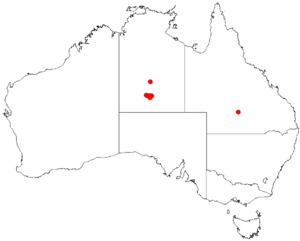Hakea standleyensis facts for kids
Quick facts for kids Hakea standleyensis |
|
|---|---|
| Scientific classification |
|
| Kingdom: | Plantae |
| Clade: | Tracheophytes |
| Clade: | Angiosperms |
| Clade: | Eudicots |
| Order: | Proteales |
| Family: | Proteaceae |
| Genus: | Hakea |
| Species: |
H. standleyensis
|
| Binomial name | |
| Hakea standleyensis Maconochie
|
|
 |
|
| Where it grows in Australia | |
| Script error: The function "autoWithCaption" does not exist. | |
Script error: No such module "Check for conflicting parameters".
The Hakea standleyensis is a special kind of shrub that grows in the Northern Territory of Australia. It's a small plant with a unique, twisted shape. You can often find it growing on rocky ledges of cliffs.
Contents
What Does Hakea Standleyensis Look Like?
This interesting plant is a shrub that can grow between 0.9 m (3 ft) and 2 m (7 ft) tall. It can also spread out to about 1 m (3 ft) wide. It has many stems and doesn't have a lot of leaves, making it look a bit sparse.
When the plant is young, its smaller branches and new leaves are covered in soft, silky hairs. As the plant gets older, these hairs disappear, and the branches become smooth. Its leaves are shaped like needles and are often a bit curved. They grow close together at the bottom of the stems. These leaves can be 2 cm (0.8 in) to 9.5 cm (4 in) long and about 1.2 mm (0.05 in) to 1.7 mm (0.07 in) wide.
Flowers and Fruit
The Hakea standleyensis produces beautiful white flowers. These flowers grow in clusters of 6 to 12. Each flower is surrounded by special leaf-like parts called bracts. The flowers themselves are small, only about 4 mm (0.2 in) to 5 mm (0.2 in) long, and they grow on short stems. You can see these flowers blooming from September to October.
After the flowers, the plant grows egg-shaped fruits. These fruits are about 1.3 cm (0.5 in) to 1.5 cm (0.6 in) long and 4.5 mm (0.2 in) to 6 mm (0.2 in) wide. They have a wrinkled, bluish-green surface and end in a tiny point, about 1 mm (0.04 in) long.
Where Does Hakea Standleyensis Live?
This plant is quite rare and only grows in a specific area of the Northern Territory called the MacDonnell Ranges. It likes to grow in very thin soil found on the ledges of quartzite cliff faces. This means it's a tough plant that can survive in harsh, rocky places!
How Was Hakea Standleyensis Named?
The Hakea standleyensis was first officially described in 1973 by a scientist named John Maconochie. He wrote about it in a scientific paper called Transactions of the Royal Society of South Australia. The plant was given its name because it is found near a famous place called Standley Chasm in the MacDonnell Ranges.
Conservation Status
Because it only grows in a small area, Hakea standleyensis is considered a 'Rare' plant. This means it's important to protect its habitat so it can continue to thrive.
 | Percy Lavon Julian |
 | Katherine Johnson |
 | George Washington Carver |
 | Annie Easley |

